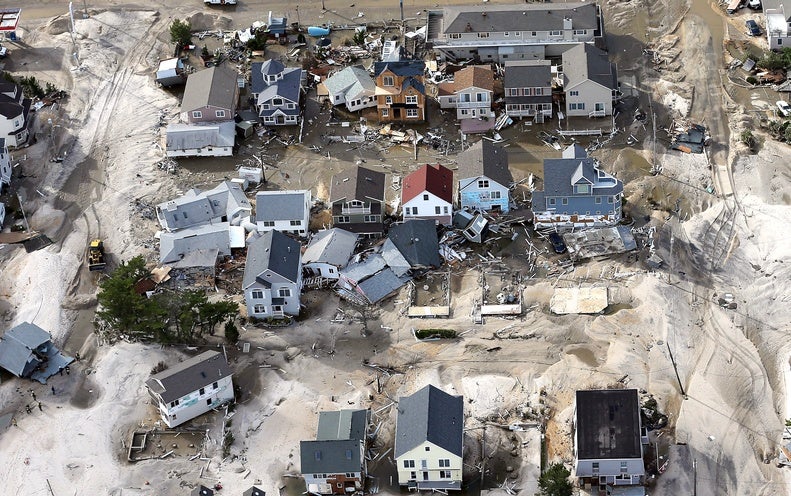New Jersey on Tuesday threw its weight behind a growing effort by local governments to hold oil and gas companies financially accountable for allegedly lying to consumers about the fossil fuel industry’s role in accelerating climate change.
The Garden State’s lawsuit—one of two dozen climate liability cases filed by cities, states and counties nationwide—comes as the Supreme Court weighs two industry petitions that seek to quash the liability cases. It also comes almost exactly 10 years after Superstorm Sandy made landfall in New Jersey, killing 38 and leaving more than 300,000 homes damaged.
State Attorney General Matthew Platkin (D), who filed the case in New Jersey Superior Court, said while announcing the lawsuit that New Jersey would have been better prepared for the storm had the fossil fuel industry not downplayed the risks of burning fossil fuels.
“We could have taken actions that would have mitigated or even eliminated many of the risks of climate change, including the prevalence of dangerous storms like Sandy,” Platkin said. “Today we begin to right the wrongs inflicted on our residents by companies who deliberately chose profits over our global environment and the well being of our residents.”
New Jersey’s case claims that the American Petroleum Institute—along with Exxon Mobil Corp., Shell PLC and others—violated state consumer fraud law by hiding information and misleading the public about climate change.
The complaint asks for compensation for the loss of wetlands and other costs of dealing with climate change, along with punitive damages because the industry’s conduct, the suit alleges, “exhibited a wanton or willful disregard for the rights of the state and its residents, and was committed with actual malice.”
New Jersey’s lawsuit joins a slew of challenges from mostly Democratic-led governments that seek to hold oil and gas firms accountable for making and selling products that have contributed significantly to atmospheric greenhouse gas emissions and rising global temperatures. In New Jersey, the city of Hoboken filed its own consumer fraud lawsuit against the industry in 2020 (Greenwire, Sept. 2, 2020).
Local officials have argued that energy companies should be on the hook for wildfires, flooding and other climate-induced disasters that plague cities, counties and states nationwide.
The Manufacturers’ Accountability Project, an initiative of the National Association of Manufacturers that opposes the liability litigation, said New Jersey’s lawsuit would do nothing to address climate change and is a “costly distraction from the important work that needs to be done.”
“This litigation has no legal merit, which is why it has been rejected by the federal courts already,” said Phil Goldberg, the group’s special counsel, referring to a similar lawsuit from New York City that was filed in federal court. “Courts are simply not the appropriate places to decide climate policy. They cannot take into account important aspects of America’s energy policy, including affordability for families and businesses, and energy security.”
Federal courts have drawn a distinction between New York City’s failed climate challenge and cases like New Jersey’s, which are filed in state courts and allege violations of state laws. The question of which courts—state or federal—should have jurisdiction in the climate liability litigation has stalled the cases.
The Supreme Court could soon choose to weigh in again on the procedural question after handing a narrow victory in 2021 to the oil and gas companies, which believe the local governments’ claims would be tossed out in federal court (Climatewire, Oct. 18).
Goldberg said New Jersey should instead focus on working with manufacturers to address climate change.
“The Biden administration has made billions of dollars in funding available through federal programs to help communities like those in New Jersey deal with the impacts of climate change,” Goldberg said. “It’s time to move on from this litigation sideshow and focus on real solutions.”
Chevron Corp. attorney Theodore Boutrous, a partner at the firm Gibson, Dunn & Crutcher LLP, called the lawsuit a “distraction from the serious problem of global climate change, not an attempt to find a real solution.”
New Jersey, like many of the challengers in the climate liability cases, has hired California-based law firm Sher Edling LLP as outside counsel. Boutrous said that “like the others in the series brought by the same private plaintiffs lawyers, it is a special-interest lawsuit asking the Superior Court of New Jersey to punish a select group of energy companies for a problem that is the result of worldwide conduct stretching back to the beginning of the Industrial Revolution.”
He said Chevron believes the claims are “legally and factually meritless and will demonstrate that in court. In the meantime, Chevron will continue working with other stakeholders in the public and private sectors to craft real solutions to global climate change.”
Platkin argued that although the companies lied to the public about climate change, they took steps to shield their own investments from risk, including raising offshore drilling platforms to account for sea level rise.
“They did things that governments and our residents could and would have done had we been warned properly earlier,” he said. “It’s long overdue that these betrayals of their customers and of the public come to an end, and that the perpetrators of these lies pay for their conduct and that the people in New Jersey receive restitution for all that they have lost.”
Shawn LaTourette, the New Jersey Environmental Protection commissioner, said the state is “ground zero” for some of the worst effects of climate change. He said New Jersey faces a risk of sea level rise two times greater than most other places.
“Our communities and our environments are continually recovering from extreme heat from devastating floods, from droughts,” LaTourette said, adding, “I hate to be a bummer. It only gets worse from here.”
Reprinted from E&E News with permission from POLITICO, LLC. Copyright 2022. E&E News provides essential news for energy and environment professionals.


